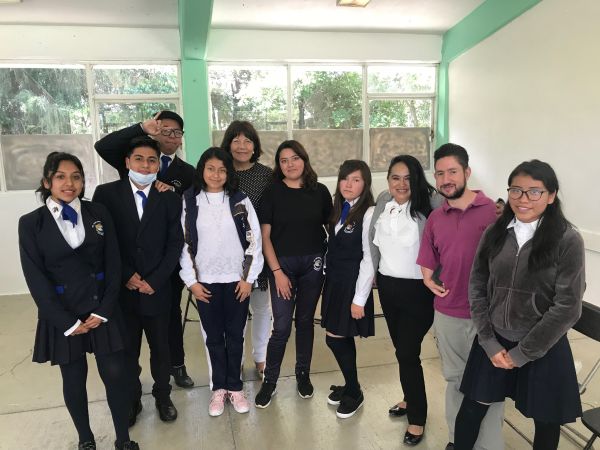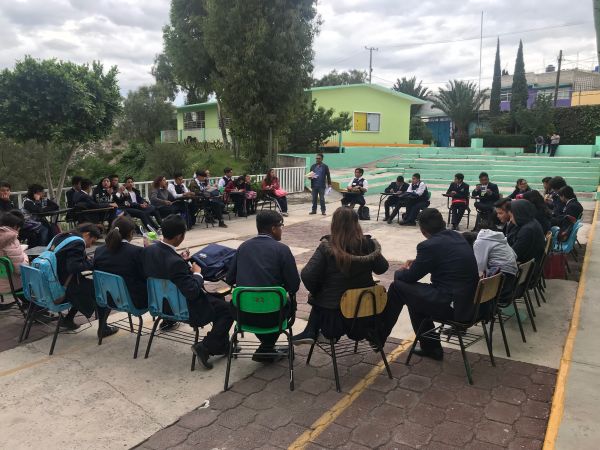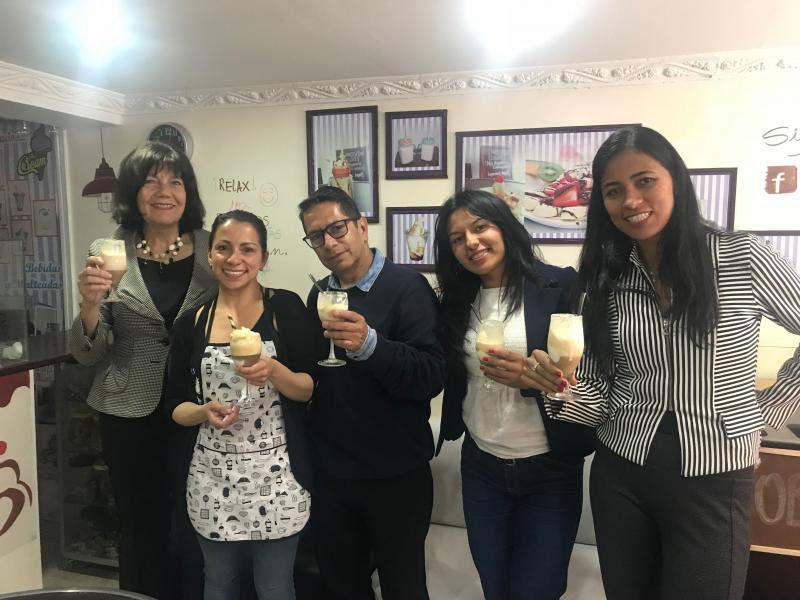Liveryman Gia Campari highlights impressive business lessons learned from South America, during pro bono activity for a WCoMC client...
“We have nothing to learn from South America.” was the reply I received from the CEO of a European organisation when I suggested he contact the South

Dr Gia Campari
Liveryman
American sister company to find out how they approached internal communication. Prejudices die hard and that is a great pity - for the people who are behind and who could avoid reinventing the wheel, not for those who are striding ahead.
My visits to South America had the specific purpose of assessing local partners of the UK based charity Youth Business International (YBI).

Students, Entrepreneurs and Teachers - Mexico
The local partner does what all partners of YBI do: they help under-served youths set up their own businesses, usually by providing training, a loan and a mentor. This formula has proved to increase the percentage of startups that are still ongoing after three years. Like all charities, YBI local partners finance their operations through public and private donations.
I was surprised to find so many excellent and innovative business practices during my assessments. On more than one occasion I have been on the verge of telling managers I meet in Europe to get on a 'plane and go and to South America to find out how to run a business efficiently!

Entrepreneurship Training - Tech High School, Mexico
One entrepreneur who founded a successful catering business moved from Uruguay to Paraguay to do that. His reasoning was that in Uruguay, which is one of the wealthier South American countries, businesses are more established and so are how things are done. In Paraguay, which is one of the poorest countries, there are far fewer established ways of doing things, so he was able to create from nothing, which is the requisite for true creativity.
Here are some examples of "nothing” generating creative business practices:
Corporate social responsibility
The best example of Corporate Social Responsibility I’ve come across is in Peru. CSR is taken very seriously and companies want to be seen to be doing the right thing.
The main economic activity in Peru is mining: copper, gold, zinc. Each mine has a limited lifespan (15-20 years). When a mine opens - usually in the middle of nowhere - it creates/boosts the local economy, often creating the only source of income in the area. Some mining companies have taken the following approach to CSR: they are aware that when they close the mine, the local economy will practically collapse. Therefore they have decided to finance local start-ups so that when they close the mine, some of these start-ups will have become successful and will have created an alternative economy.
The mining companies fund the local YBI partner because they commissioned an independent study to measure the success of start-ups in the YBI programme compared to the start-ups that are not supported by YBI - and the results were impressive. The number of YBI start-ups ongoing after two years was 69% compared to 30% for non YBI start-ups.
The mines do not only provide funds, they meet the local partner at least once a month and want details of all the start-ups and the progress they are making. They take a genuine interest in this initiative and put a lot of pressure on the YBI partner to help make the startups successful. They see this as a 20-year commitment, the typical lifespan of a mine.
Employee engagement
The Uruguayan entrepreneur mentioned above asks his employees what bonuses they wish to receive at the end of the year. The employees produce a list and then vote for one. And they do not all vote for an increase in salary! I can recall only a couple of the bonuses chosen:
1. Having the day off on one’s birthday - apparently very popular with employees in that company - the CEO was surprised, but that’s what they asked for and that’s what they got.
2. An ‘Entertainment” card: a card loaded with a fixed amount of money that allows the holder to book theatre, cinema, concert, etc. tickets. It can’t be used for other purposes. This is part of an initiative to raise employees’ standard of living. There are many ways of being poor; and being culturally poor is one of them. I found this truly innovative and showing a deep understanding of the many faces of poverty. I would hate to hazard a guess as to how many people in the developed countries are culturally really very poor.
If anyone knows of similar initiatives in Europe or the USA, I’d love to hear about them.
I could tell just by spending some time in the company that the level of employee engagement was through the roof!
Management meetings
The senior management of an organisation of 500 people meet once a month and, without fail, get everything done in two hours. Their business is project based, and they use the standard traffic light system to gauge the status of each project. Only projects that are amber or red are discussed during the meeting.
I compare this to a senior management team I worked with that knew when the meeting would start but had no idea when it would end.
IT
In most of the organisations I visited, the IT systems were world class. All the information I requested was only a few clicks away. Also, entry to the office compound in one of these “developing countries” was via fingerprint (and it worked every time!) Yet I have never been able to unlock my iPhone with my fingerprint!!!
Internal communication
The afternoon of the last Friday of the month is dedicated to internal communication. The CEO addresses the whole company in person at HQ and via video link at other locations and tells employees what has been achieved during the past month and the objectives of the coming month; followed by Q&A. Everyone attends. I could have stopped anyone in the organisation and asked what the strategy was and I would have received the same answer. Everyone totally aligned with the organisational mission and strategy.
A business plan does not a business make
Most entrepreneurial training I have encountered in my very long career has been centred around the business plan.

Entrepreneurs and YBI Team - Colombia
In Colombia I found an organisation that truly understands the meaning of entrepreneurship and that starts all entrepreneurial training with a Socio-psychological assessment of the entrepreneur and his/her family. They know that being an entrepreneur takes a big toll on the family and if the entrepreneur’s family does not understand what is needed and does not provide the required support, the chances of the business failing increases. The Business Plan and all the relevant ‘hard’ training (marketing, finance, etc.) are developed in parallel.
All the entrepreneurs I interviewed in Colombia said how important this Socio-psychological assessment and subsequent support had been for them. One in particular said that his business was putting a lot of strain on his relationship with his wife, but after the socio-psychological assessment and subsequent workshops, the marriage was back on track as was his business. He could not praise the YBI partner enough.
I doubt that this aspect of entrepreneurship is adequately addressed in Entrepreneurship courses run by Business Schools and Universities.
It is well known that the less baggage we carry, the higher the chances of finding innovative solutions to our problems. We can start by keeping our minds, eyes and ears open.
Gia Campari, Liveryman